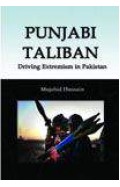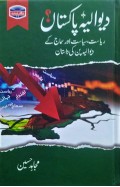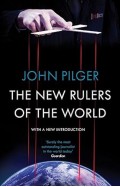CORRUPTION IN STATE & PARTIES IN PAKISTAN
By: Mujahid Hussain
-
Rs 2,396.00
- Rs 2,995.00
- 20%
You save Rs 599.00.
Due to constant currency fluctuation, prices are subject to change with or without notice.
Mujahid Husain is an investigative journalist, whose work is without frills, focusing on facts that reveal the truth. This makes his work extremely useful because it is bare of Urdu’s usual frills: and unusual because of the torrent of facts at his command. He talks in this book about “Diwaliya Pakistan” (Bankrupt Pakistan) that Urdu journalism is unfamiliar with. Those who go in for English journalism for truth undiluted by emotion should read Mujahid’s book because its presentation is held together with a practical style and heretofore unknown facts. One example is his narration of relationships between Imran Khan and the two Bajwas that we know little about. The first Bajwa is Lieutenant- General Asim Saleem Bajwa and the second is General Qamar Javed Bajwa, both ironically linked to accumulated fort tines abroad, but the latter is responsible for Khan’s final comedown. The details of these two relationships lie at the root of Pakistan’s current narrative. What one must not ignore however is the unconventional Urdu style of writing employed by Mujahid Husain: no frills, but flowing to prevent the reader from wandering from the theme. Other accounts like the one on Maw. Sharif and the other on the Bhutto-Zardari clan unveil details of unsavoury corruption that mars the life-stories of most Pakistani politicians and moral bankruptcy of both sorts, civilian and military. The style is without irritating sub clauses-which means no exaggeration because the facts themselves appear overwhelming.
Mujahid Husain is an investigative journalist, whose work is without frills, focusing on facts that reveal the truth. This makes his work extremely useful because it is bare of Urdu’s usual frills: and unusual because of the torrent of facts at his command. He talks in this book about “Diwaliya Pakistan” (Bankrupt Pakistan) that Urdu journalism is unfamiliar with. Those who go in for English journalism for truth undiluted by emotion should read Mujahid’s book because its presentation is held together with a practical style and heretofore unknown facts. One example is his narration of relationships between Imran Khan and the two Bajwas that we know little about. The first Bajwa is Lieutenant- General Asim Saleem Bajwa and the second is General Qamar Javed Bajwa, both ironically linked to accumulated fort tines abroad, but the latter is responsible for Khan’s final comedown. The details of these two relationships lie at the root of Pakistan’s current narrative. What one must not ignore however is the unconventional Urdu style of writing employed by Mujahid Husain: no frills, but flowing to prevent the reader from wandering from the theme. Other accounts like the one on Maw. Sharif and the other on the Bhutto-Zardari clan unveil details of unsavoury corruption that mars the life-stories of most Pakistani politicians and moral bankruptcy of both sorts, civilian and military. The style is without irritating sub clauses-which means no exaggeration because the facts themselves appear overwhelming.
CORRUPTION IN STATE & PARTIES IN PAKISTAN
By: Mujahid Hussain
Rs 2,396.00 Rs 2,995.00 Ex Tax :Rs 2,396.00
Zubin Mehta: A Musical Journey (An Authorized Biography)
By: VOID - Bakhtiar K. Dadabhoy
Rs 472.50 Rs 1,050.00 Ex Tax :Rs 472.50
Myths Illusions and Peace: Finding a New Direction for America in the Middle East
By: Dennis Ross
Rs 876.00 Rs 1,095.00 Ex Tax :Rs 876.00
The Origins of Political Order From Prehuman Times to the French RevolutioN
By: Francis Fukuyama
Rs 3,116.00 Rs 3,895.00 Ex Tax :Rs 3,116.00
Manning Up: How the Rise of Women Has Turned Men into Boys
By: Kay Hymowitz
Rs 646.75 Rs 995.00 Ex Tax :Rs 646.75
The Obama Syndrome: Surrender At Home War Abroad
By: Tariq Ali
Rs 1,036.00 Rs 1,295.00 Ex Tax :Rs 1,036.00
The Quest For Meaning: Developing A Philosophy Of Pluralism
By: Tariq Ramadan
Rs 1,116.00 Rs 1,395.00 Ex Tax :Rs 1,116.00
No recently viewed books available at the moment.
Zubin Mehta: A Musical Journey (An Authorized Biography)
By: VOID - Bakhtiar K. Dadabhoy
Rs 472.50 Rs 1,050.00 Ex Tax :Rs 472.50
CORRUPTION IN STATE & PARTIES IN PAKISTAN
By: Mujahid Hussain
Rs 2,396.00 Rs 2,995.00 Ex Tax :Rs 2,396.00















-120x187.jpg?q6)









-120x187.jpg?q6)





